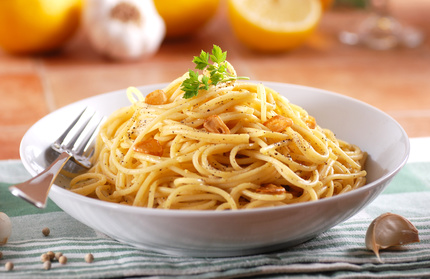
Carb back-loading vs front-loading: Which is better for getting lean?
Listening to Robb Wolf”s The Paleo Solution podcast interview of Keifer, author of Carb Back-Loading and Carb Nite, I learned some very interesting new research regarding the timing of carb consumption for those who have a body fat reduction goal. Keifer talks about a recent study with 3 groups of people; they consumed the same amount of calories. (He did not go into further detail about how many people were in the study, duration of time, etc.)
- Group 1 ate carbs early in the day;
- Group 2 ate carbs throughout the entire day;
- Group 3 ate carbs at dinner and close to bedtime.
Although the groups all lost near identical scale weights, group 3 lost more body fat and maintained more muscle mass than the other 2 groups. This is pretty counter-intuitive as we’ve all been told things like “Don’t eat carbs past 3pm” or “Eat the majority of your calories before 6pm” etc.
So, why did this happen? Here is Keifer’s scientific explanation, in a nut shell: We all wake up in a fasted ketogenic state, meaning, our body is burning fat. Our hormonal situation is in a fat burning state – why mess this up by eating carbs at breakfast? Eating carbs early in the day will make it easier for the body to store fat because it decreases the enzymes necessary to get fat out of fat cells and increases enzymes to get fat into fat cells.
The opposite happens in muscle cells. There is a decreased ability to get fat into muscle cells and an increased ability for fat to release. Removing carbs from the diet has the exact opposite effect. But when eating carbs at night, the healthy muscle tissue, rather than adipose tissue, is willing to store the fat. You will use this for fuel the next day in your muscles because the overnight period without carbs is priming them to be better at using fat early the next day. In addition, eating carbs at dinner releases serotonin, a sleepy hormone – perfect timing right before bed!
The body is also more sensitive to insulin in the morning. This means the body will uptake glucose into the muscle cells easier, which is good, but this is also true for fat cells, a potentially bad thing. It is suggested to train in the afternoon rather than in the morning, and eat the majority of carbs post-workout and evening. The body will not store carbs as fat for about an hour post resistance training workout, so chow down!
I eat only vegetables for carbs for the first half of my day, and eat starches (rice, sweet potato) post workout and at dinner. I do find this works for me, reducing overall carb cravings and is more effective for staying lean. I don’t eat starches before my workout so that my body uses fat for fuel instead of carbs, especially during a fat burning, low intensity cardio session following resistance training. If you have back-loaded properly the night before, you will have enough glycogen reserves to get through a resistance training session…but, if you are worried about energy levels, eat some simple carbs pre-workout, such as a low fructose fruit or white rice.
To properly carb back-load, eat protein, fats, and low carb veggies up until post-workout. Post-workout and at dinner eat protein and carbs, keeping fats relatively low.